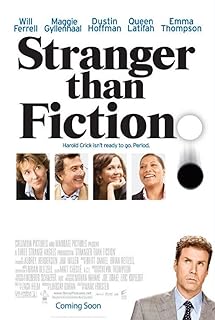
2008-05-26 18:06:26
A denial of greatness
************這篇影評可能有雷************
Why has literature been loved by the world for so long? One answer is that literature reflects humanity and solves conflicts within humanity. But starting from its name, 「Stranger than Fiction」, the movie begins to question the credibility of literature. Would the character agree with the literature he is in? The movie gives us an answer of 「no」. Do we like people dying in reality? If not, then why do we like to read literature with a lot of deaths? Life and literature can never form a harmony. Even Harold Crick, the main character of the fiction, agreed at last that for a great literature, he had to behave against his instinct and die for the sake of art. What is wrong with literature? –and more sharply, for many of us thinking deaths makes a good literature, what is wrong with our mind? For me the conflict is between us readers』 pursuit of greatness and real life’s triviality. The movie itself leans towards the latter, portraying the post-modern world a series of denials of greatness.
The most obvious conversion to triviality is the life change of Harold Crick. If we put him in a different setting other than post-modern, his high self-control, strict self-discipline, and very professional skill in working will make him a great hero figure in the history, like a remarkable Spartan warrior. He is simply a symbol of greatness. His change would be a tragedy at that time setting—a tragic fall of the hero’s mind. Because of a lack of defense in his will power, a wicked devil (here represented by the watch) seduces Harold Crick with beauty, and he sells his discipline, his skill—all that form his spirit in exchange for a beautiful girl, similar to the tale of Faust. But we post-modern world do not think that way anymore. Both by the movie and audience, Harold Crick is considered even worse than an ordinary man, a weirdo, to be exact. The importance of greatness is neglected in this world, and even derided. People see Harold’s conversion to love and less disciplined life a happy liberation. Although he is no more unique and can no more be admired for his great talent in calculation, people think it is nothing to be sad about—he now becomes one of us, us trivial people. Greatness is so happily denied.
Another paramount development the movie depicts is the mentality change of the writer, Karen Eiffel. To achieve greatness she never compromised for triviality before. Three scenes together emphasize her strong pursuit. Her insistence on observing dying people without any pity, and her reminisce on how she killed her previous characters are all examples of the pursuit of tragic greatness overcoming emotion and sympathy. Her indifference when she drove herself into the river reveals even more of her determination. This greatness, again, is mocked by the movie when she loses her courage as she find out she is killing a real person. She convinces herself that if her hero knows about the eminent death and determines to embrace it, then the hero should not be given the right to live. But even for me, with little knowledge of literature compare to her, know that a story will be more or less like a joke if the hero finally gets to live under that situation, his greatness mocked by his fate, whereas it will make a much stronger piece when the hero dies by embracing it. But Karen has no choice; she cannot kill a person in reality. And greatness has to sacrifice.
Post-modern world is a world worshiping triviality, in which greatness lost its dignity and place. Stranger than Fiction predicts the necessity of heroes』 fall. Ms. Pascal finally finds her great dream of 「making the world a better place」 in baking cookies. It implies a great metaphor of our time—great dream must die, and we have to look for happiness in the endless ocean of triviality.

